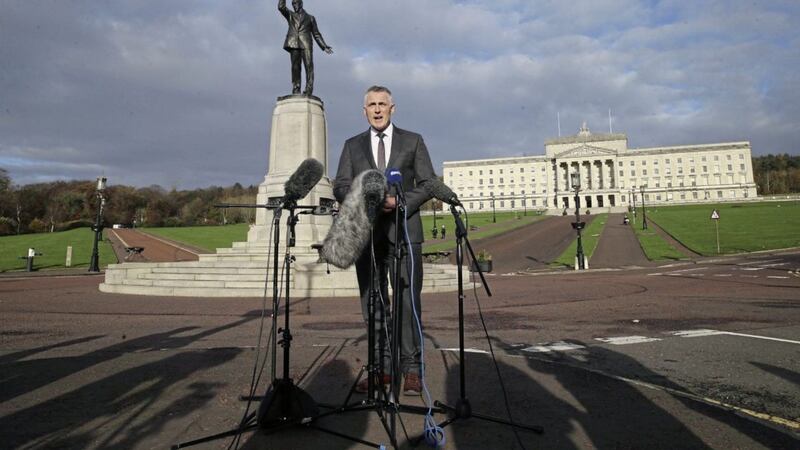Five years in the making. £800,000 in funding. Around 40 or so recommendations.
And yet on the day that the Commission on Flags, Identity, Culture and Tradition finally published its report it is confirmed by executive sources that diddly squat will be done to implement any of the recommendations in the foreseeable future.
Bearing in mind that NI politics is so embedded in the past that executive meetings are best done by séance, anything consigned to the ‘foreseeable future’ may as well just be placed in a time capsule which is then buried in quicksand on Mars.
But is anyone actually surprised by this rebooting of ‘the dog ate my homework’ process? Of course not. The executive works on the basis that it has to be seen to be doing something on difficult decisions (which is every decision on which there is no obvious agreement between the DUP and Sinn Féin); even though it knows the end result will always be a Dickensian-sized report which will be trumpeted as a ‘genuine effort to reach resolution’ before being left to gather dust or prop up a wonky desk.
Justice minister Naomi Long was right to say the report was being “orphaned, with nobody taking responsibility for it.” Professor Dominic Bryan, who oversees the commission, tried to sound optimistic: “I think we’ve moved forward in significant ways and I hope when people read it they’ll see the positive stuff in what we can do in a diverse society.”
In fairness, though, very few people will read it (and that includes quite a few of the MLAs, by the way, who’ll rely on a party press/policy officer to hand down a briefing)—because what is the point of reading a document which you’ve already been told is going nowhere in terms of implementation?
Sinn Féin junior minister Declan Kearney said the report should have been accompanied by a plan for implementing the recommendations: “I would much rather see scaffolding established in order to ensure an orderly implementation of those proposals within the report that I believe are deliverable. There are clearly challenges which remain, but if we had a framework of next steps then we could tackle those”.
Hmm. The executive was handed the report in July 2020. A working group, chaired by Kearney and DUP junior minister Gary Middleton has been ‘considering’ (one of the most weaselling words in politics) it for the past 18 months. Plenty of time, you would have thought, to establish some sort of scaffolding. But no: meaning all we’ll get is the same people who’ve been talking about it for the past 18 months continuing to talk about it on some sort of continuous loop. Maybe Kearney could have explained why, exactly, there isn’t an implementation plan, rather than try and push the blame onto others. Better still, why not cut to the chase and explain why another 18 months has been wasted.
What struck me most about Wednesday’s publication was the total absence of any sense of shame, embarrassment or failure from the executive. What is the point of establishing a commission to address issues they (particularly the DUP and SF) can’t agree on and then singularly fail to implement the report they asked for? What an enormous waste of time, money and credibility. Which will, inevitability, be followed by months of blame and counter-blame in the run-up to an election due next May.
Sadly, this very peculiar form of government is not new. And nor is it likely to improve any time soon. They get away with it because they are allowed to get away with it. Partly by the three smaller parties who prop them up in the executive and are totally ignored for their efforts; but mostly by a majority of voters who still seem to think it’s acceptable to reward monumentally awful government by re-electing the key people responsible for it.
The report was published on Wednesday rather than last Monday, which was the 1000th plenary sitting of the assembly since 1998. Speaker Alex Maskey referred to its ‘chequered history’ and warned of complacency. A bit late for that sort of warning.
Complacency took root as soon as the parties realised that successive governments would bail them out of whatever hole they landed themselves in; that there was no punishment for serial stupidity and failure to deliver; that the Good Friday Agreement was still regarded by the British/Irish/American governments as ‘too big to fail’; and that enough of their core vote would continue to back them irrespective of how useless they were.




